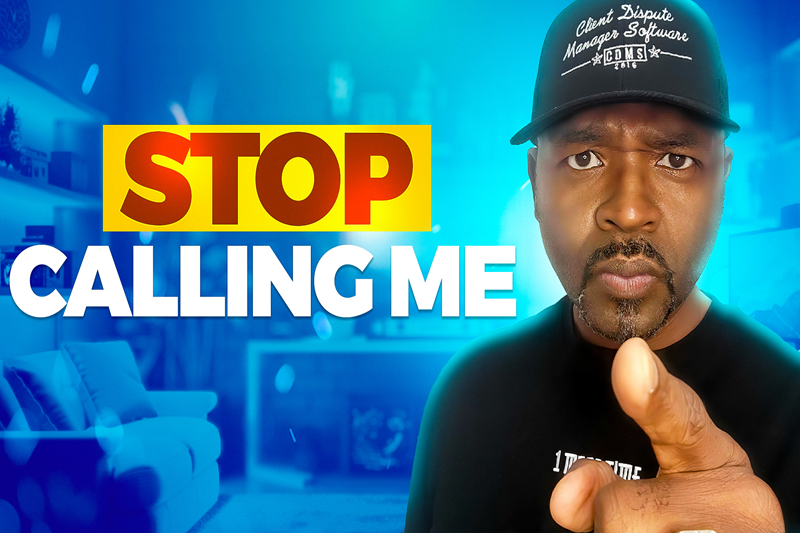Dealing with debt collectors can be an overwhelming and stressful experience, especially when they resort to constant calls and harassment. However, it’s essential to know that debt collection harassment laws, such as the Fair Debt Collection Practices Act (FDCPA), protect you from abusive debt collection practices.
This article will discuss how to stop debt collector calls, your FDCPA rights, and the debt collection harassment laws that shield you from debt collector harassment.
Understanding Your FDCPA Rights to Stop Debt Collector Harassment
The FDCPA is one of the most important debt collection harassment laws that regulate the actions of third-party debt collectors and protect consumers from unfair and abusive practices. Under the FDCPA, you have the right to:
- Stop debt collector calls at inconvenient times (before 8am or after 9pm)
- Stop debt collector calls at your workplace if your employer prohibits such calls
- Request that debt collectors cease all forms of contact
- Be free from harassment, lies, and unfair practices by debt collectors
- Receive proper identification from debt collectors and be informed that any information obtained will be used to collect the debt
Knowing your FDCPA rights is crucial when you deal with debt collectors. If a debt collector violates your rights, you can take legal action against them within one year of the violation, as permitted by debt collection harassment laws, and potentially receive compensation for damages and attorney’s fees.
How to Stop Debt Collector Calls with a Cease and Desist Letter?
One of the most effective ways to stop debt collector calls is by sending a written cease and desist letter. Under the debt collection harassment laws outlined in the FDCPA, you have the right to request that debt collectors stop contacting you.
Once they receive your letter, they can only reach out to inform you of specific actions, such as filing a lawsuit.
Crafting an Effective Cease and Desist Letter to Deal with Debt Collectors
When writing your cease and desist letter, it’s important to keep in mind the debt collection harassment laws and the statute of limitations for your specific debt. If the debt is still within the statute of limitations, it’s best to request that the debt collector stop calling you but allow them to contact you by mail.
This prevents them from escalating the situation by suing you to collect the debt. A well-crafted cease and desist letter should include:
- Your identification and the specific debt in question
- A clear statement that you are requesting the collector to stop calling you under the debt collection harassment laws in the FDCPA
- Instructions that future communication must be in writing only
- A warning that you will file complaints with the FTC and CFPB if they don’t comply
- Proof of delivery (e.g., certified mail receipt)
By asserting your FDCPA rights through a cease and desist letter, you can effectively stop debt collector calls and protect yourself from debt collector harassment.
Dealing with Debt Collectors as a Credit Repair Company

Credit repair companies often assist clients in dealing with debt collectors. As a credit repair professional, you can help your clients stop debt collector calls and navigate the complexities of debt collection harassment laws and FDCPA rights.
Using Software to Manage Cease and Desist Requests for Clients
One way to efficiently manage cease and desist requests for your clients is by using specialized software like the Client Dispute Manager Software. This tool allows you to quickly generate and send cease and desist letters on behalf of your clients, ensuring that their FDCPA rights are protected and debt collector harassment is minimized, in accordance with debt collection harassment laws.
Utilizing Debt Validation Letters to Deal with Debt Collectors
In addition to cease and desist letters, credit repair companies can also utilize debt validation letters to help their clients deal with debt collectors. These letters request that collectors provide proof of the debt’s validity and their legal right to collect on it.
By employing these strategies and leveraging debt collection harassment laws, credit repair professionals can provide valuable support to their clients and help them navigate the often-stressful process of dealing with debt collectors.
Protecting Yourself from Debt Collector Harassment
Debt collection harassment laws, such as the FDCPA, provide consumers with a powerful tool to fight back against abusive debt collection practices. If you feel that a debt collector has violated your FDCPA rights or engaged in harassment, you can take the following actions:
- Keep Detailed records of all interactions with the debt collector, including call logs, voicemails, and written correspondence
- File a complaint with the Consumer Financial Protection Bureau (CFPB) and the Federal Trade Commission (FTC), citing violations of debt collection harassment laws
- Consider seeking legal advice from an attorney specializing in debt collection harassment laws and FDCPA rights
- If the violations are severe, consider filing a lawsuit against the debt collector based on the protections provided by debt collection harassment laws
By knowing your FDCPA rights and actively protecting yourself from debt collector harassment, you can effectively deal with debt collectors and stop debt collector calls.
Frequently Asked Questions (FAQs)
Can Debt Collectors Call Me At Any Time?
No, debt collection harassment laws prohibit debt collectors from calling you before 8am or after 9pm, unless you give them permission to do so.
What Should I Do If A Debt Collector Is Harassing Me?
Keep detailed records of the harassment, send a cease and desist letter, and file complaints with the CFPB and FTC. If the harassment persists, consider seeking legal advice from an attorney specializing in debt collection harassment laws.
Can I Sue A Debt Collector For Violating My FDCPA Rights?
Yes, debt collection harassment laws allow you to take legal action against a debt collector within one year of the violation. If you win, you may be entitled to damages and attorney’s fees.
How Long Can A Debt Collector Attempt To Collect A Debt?
The statute of limitations for debt collection varies by state and type of debt. It’s essential to familiarize yourself with the specific debt collection laws in your state to understand your rights.
Can A Debt Collector Contact My Employer Or Family Members About My Debt?
Debt collection harassment laws generally prohibit debt collectors from contacting your employer or family members about your debt, except in specific circumstances, such as to obtain location information.
Conclusion
Dealing with debt collectors can be a daunting task, but understanding your FDCPA rights and the debt collection harassment laws that protect you can help you stop debt collector calls and put an end to debt collector harassment.
By sending a well-crafted cease and desist letter and asserting your rights under debt collection harassment laws, you can take control of your financial situation and find relief from the stress of constant collection calls.
If you find yourself overwhelmed by multiple collection accounts, seeking the assistance of a reputable credit repair company may be beneficial. These professionals are well-versed in FDCPA rights and debt collection harassment laws, and they can help you navigate the process of dealing with debt collectors.

Mark Clayborne
Mark Clayborne specializes in credit repair, starting and running credit repair businesses. He's passionate about helping businesses gain freedom from their 9-5 and live the life they really want. You can follow him on YouTube.
Below Is More Content For Your Review:
- How to Sue a Debt Collector: A Step-by-Step Legal Guide
- Prepare Your Dispute Letters for the Collectors in 15 Seconds

